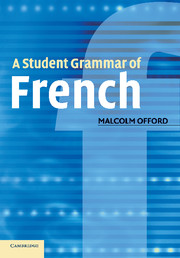Book contents
- Frontmatter
- Contents
- Acknowledgements
- Introduction
- Chapter 1 Verbs: 1
- Chapter 2 Verbs: 2
- Chapter 3 Tabular treament of verbs
- Chapter 4 Verb list
- Chapter 5 Nouns and adjectives
- Chapter 6 Pronouns
- Chapter 7 Determiners
- Chapter 8 Prepositions
- Chapter 9 Adverbs and adverbial expressions
- Chapter 10 Negation
- Chapter 11 Numerals
- Chapter 12 Sentences and clauses
- Key to exercises
- Bibliography
- Index
Chapter 12 - Sentences and clauses
Published online by Cambridge University Press: 05 June 2012
- Frontmatter
- Contents
- Acknowledgements
- Introduction
- Chapter 1 Verbs: 1
- Chapter 2 Verbs: 2
- Chapter 3 Tabular treament of verbs
- Chapter 4 Verb list
- Chapter 5 Nouns and adjectives
- Chapter 6 Pronouns
- Chapter 7 Determiners
- Chapter 8 Prepositions
- Chapter 9 Adverbs and adverbial expressions
- Chapter 10 Negation
- Chapter 11 Numerals
- Chapter 12 Sentences and clauses
- Key to exercises
- Bibliography
- Index
Summary
Sentences
Sentences
Sentences in writing
Sentences are very visible in writing – they begin with a capital letter and end with a full stop, question mark or exclamation mark – and what comes next is usually another sentence beginning with another capital letter and so on. When we write, we automatically construct what we want to say out of sentences – sentences are the building blocks of connected language, and we use punctuation marks of various types to show where sentences begin and end and how they hang together internally.
Sentences in speech
However, in speech, things are different. When we speak we are not so aware of forming sentences – our speech seems to flow naturally, we do not think in terms of full stops and commas, and we have little consciousness of passing from one sentence to another. However, if we transcribe our speech into writing, and if we analyse what we say, we would soon discover that the most convenient way of dividing it up is into sentences. So, in order to discuss speech and how it is constructed, we need to have recourse to the concept of the sentence and to realise that sentences underlie the way we express ourselves in speech as well as in writing. There are of course differences between the two modes of expression, and these will be pointed out in what follows.
- Type
- Chapter
- Information
- A Student Grammar of French , pp. 339 - 386Publisher: Cambridge University PressPrint publication year: 2006
- 1
- Cited by



